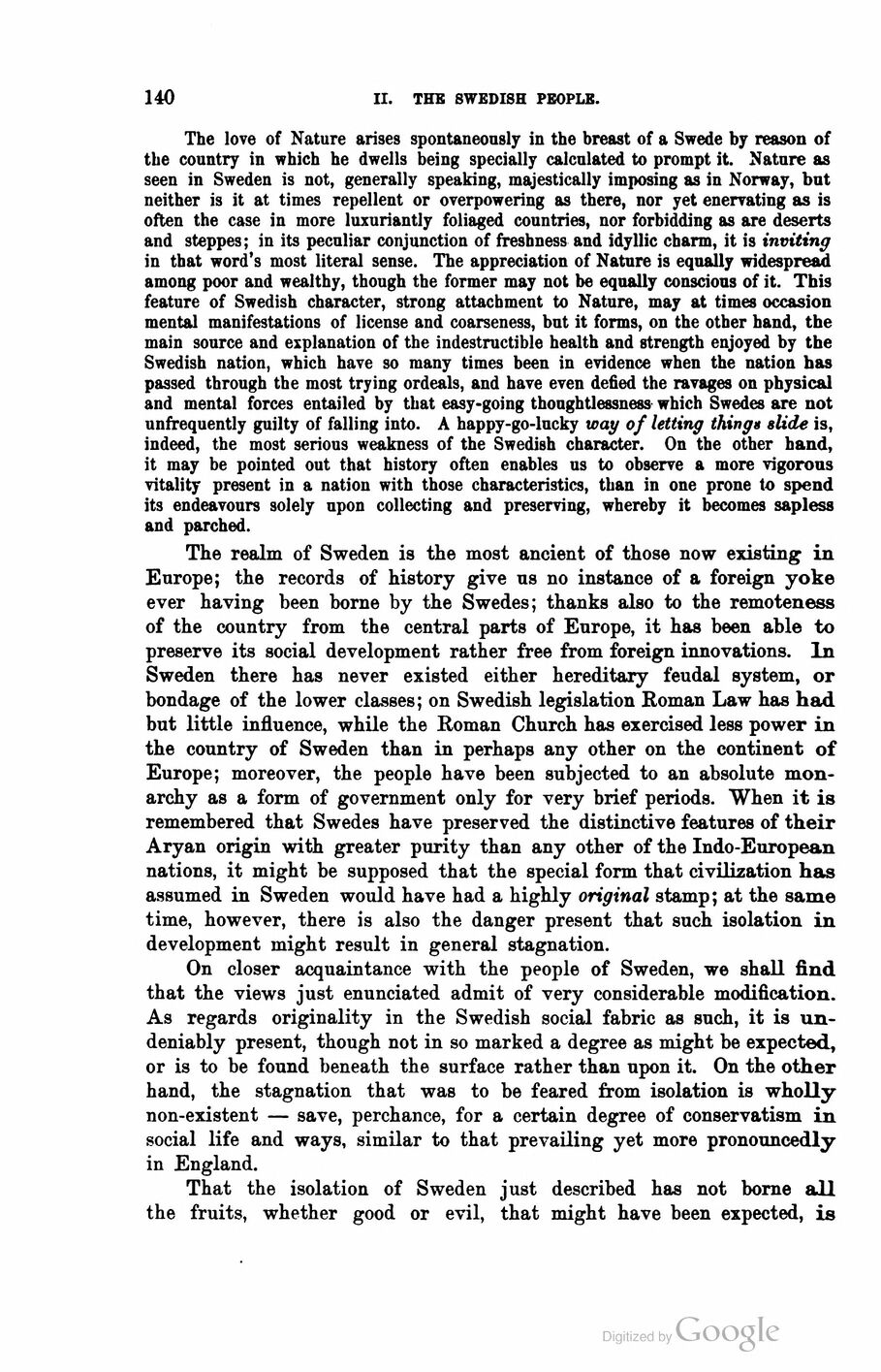
Full resolution (JPEG) - On this page / på denna sida - First part - II. The Swedish People - 3. National Characteristics. Moral and Social Conditions - National Characteristics

<< prev. page << föreg. sida << >> nästa sida >> next page >>
Below is the raw OCR text
from the above scanned image.
Do you see an error? Proofread the page now!
Här nedan syns maskintolkade texten från faksimilbilden ovan.
Ser du något fel? Korrekturläs sidan nu!
This page has never been proofread. / Denna sida har aldrig korrekturlästs.
140
II. TH B SWEDISH PEOPLE.
The love of Nature arises spontaneously in the breast of a Swede by reason of
the country in which he dwells being specially calculated to prompt it. Nature as
seen in Sweden is not, generally speaking, majestically imposing as in Norway, but
neither is it at times repellent or overpowering as there, nor yet enervating as is
often the case in more luxuriantly foliaged countries, nor forbidding as are deserts
and steppes; in its peculiar conjunction of freshness and idyllic charm, it is inviting
in that word’s most literal sense. The appreciation of Nature is equally widespread
among poor and wealthy, though the former may not be equally conscious of it. This
feature of Swedish character, strong attachment to Nature, may at times occasion
mental manifestations of license and coarseness, but it forms, on the other hand, the
main source and explanation of the indestructible health and strength enjoyed by the
Swedish nation, which have so many times been in evidence when the nation has
passed through the most trying ordeals, and have even defied the ravages on physical
and mental forces entailed by that easy-going thoughtlessness which Swedes are not
unfrequently guilty of falling into. A happy-go-lucky way of letting things slide is,
indeed, the most serious weakness of the Swedish character. On the other hand,
it may be pointed out that history often enables us to observe a more vigorous
vitality present in a nation with those characteristics, than in one prone to spend
its endeavours solely upon collecting and preserving, whereby it becomes sapless
and parched.
The realm of Sweden is the most ancient of those now existing in
Europe; the records of history give us no instance of a foreign yoke
ever having been borne by the Swedes; thanks also to the remoteness
of the country from the central parts of Europe, it has been able to
preserve its social development rather free from foreign innovations. In
Sweden there has never existed either hereditary feudal system, or
bondage of the lower classes; on Swedish legislation Roman Law has had
but little influence, while the Roman Church has exercised less power in
the country of Sweden than in perhaps any other on the continent of
Europe; moreover, the people have been subjected to an absolute
monarchy as a form of government only for very brief periods. When it is
remembered that Swedes have preserved the distinctive features of their
Aryan origin with greater purity than any other of the Indo-European
nations, it might be supposed that the special form that civilization has
assumed in Sweden would have had a highly original stamp; at the same
time, however, there is also the danger present that such isolation in
development might result in general stagnation.
On closer acquaintance with the people of Sweden, we shall find
that the views just enunciated admit of very considerable modification.
As regards originality in the Swedish social fabric as such, it is
undeniably present, though not in so marked a degree as might be expected,
or is to be found beneath the surface rather than upon it. On the other
hand, the stagnation that was to be feared from isolation is wholly
non-existent — save, perchance, for a certain degree of conservatism in
social life and ways, similar to that prevailing yet more pronouncedly
in England.
That the isolation of Sweden just described has not börne all
the fruits, whether good or evil, that might have been expected, is
<< prev. page << föreg. sida << >> nästa sida >> next page >>